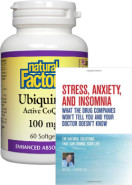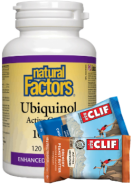Ubiquinol CoQ10
Best CoQ10 For Heart Health: Ubiquinol Vs Ubiquinone
For heart health, what is the best form of CoQ10, ubiquinol or ubiquinone? CoQ10 is a naturally occurring compound found in every cell of the human body but most concentrated in highly metabolically active organs such as the heart, liver, kidneys, brains, etc. It plays a crucial role in adenosine triphosphate (ATP) production inside the cell or cellular energy production. Read more >-
 UBIQUINOL QH ACTIVE COQ10 PROVIDES ANTIOXIDANT PROTECTION AGAINST FREE RADICALS Natural Factors Ubiquinol QH Active CoQ10 contains Kaneka QH ubiquinol, a branded form of ubiquinol manufactured exclusively by Kaneka Corporation, the world's largest manufacturer of ubiquinol. Kaneka Q10 is the world's most recognized and researched CoQ1...UBIQUINOL QH ACTIVE COQ10 PROVIDES ANTIOXIDANT PROTECTION AGAINST FREE RADICALS Natural Factors Ubiquinol QH Active CoQ10 contains Kaneka QH ubiquinol, a branded form of ubiquinol manufactured exclusively by Kaneka Corporation, the world's largest manufacturer of ubiquinol. Kaneka Q10 is the world's most recognized and researched CoQ10. In fact, in nearly every major study of CoQ10, researchers have used Kaneka Q10 ubiquinol. [SOFTGELS]+ Earn 29 Reward Points
UBIQUINOL QH ACTIVE COQ10 PROVIDES ANTIOXIDANT PROTECTION AGAINST FREE RADICALS Natural Factors Ubiquinol QH Active CoQ10 contains Kaneka QH ubiquinol, a branded form of ubiquinol manufactured exclusively by Kaneka Corporation, the world's largest manufacturer of ubiquinol. Kaneka Q10 is the world's most recognized and researched CoQ1...UBIQUINOL QH ACTIVE COQ10 PROVIDES ANTIOXIDANT PROTECTION AGAINST FREE RADICALS Natural Factors Ubiquinol QH Active CoQ10 contains Kaneka QH ubiquinol, a branded form of ubiquinol manufactured exclusively by Kaneka Corporation, the world's largest manufacturer of ubiquinol. Kaneka Q10 is the world's most recognized and researched CoQ10. In fact, in nearly every major study of CoQ10, researchers have used Kaneka Q10 ubiquinol. [SOFTGELS]+ Earn 29 Reward PointsSale: $29.99
Reg.: $44.99 (Save $15.00)
In Stock(Click Add to Select Bonus)
-
 Ubiquinol QH Active COQ10 Provides Antioxidant Protection Against Free Radicals Natural Factors Ubiquinol QH Active CoQ10 contains Kaneka QH ubiquinol, a branded form of ubiquinol manufactured exclusively by Kaneka Corporation, the world's largest manufacturer of ubiquinol. Kaneka Q10 is the world's most recognized and researched CoQ1...Ubiquinol QH Active COQ10 Provides Antioxidant Protection Against Free Radicals Natural Factors Ubiquinol QH Active CoQ10 contains Kaneka QH ubiquinol, a branded form of ubiquinol manufactured exclusively by Kaneka Corporation, the world's largest manufacturer of ubiquinol. Kaneka Q10 is the world's most recognized and researched CoQ10. In fact, in nearly every major study of CoQ10, researchers have used Kaneka Q10 ubiquinol. Ubiquinol supplements are superior to coq10 ubiquinone because they don't need to be converted by the body; therefore, they're more optimally absorbed by the body. [SOFTGELS]+ Earn 54 Reward Points
Ubiquinol QH Active COQ10 Provides Antioxidant Protection Against Free Radicals Natural Factors Ubiquinol QH Active CoQ10 contains Kaneka QH ubiquinol, a branded form of ubiquinol manufactured exclusively by Kaneka Corporation, the world's largest manufacturer of ubiquinol. Kaneka Q10 is the world's most recognized and researched CoQ1...Ubiquinol QH Active COQ10 Provides Antioxidant Protection Against Free Radicals Natural Factors Ubiquinol QH Active CoQ10 contains Kaneka QH ubiquinol, a branded form of ubiquinol manufactured exclusively by Kaneka Corporation, the world's largest manufacturer of ubiquinol. Kaneka Q10 is the world's most recognized and researched CoQ10. In fact, in nearly every major study of CoQ10, researchers have used Kaneka Q10 ubiquinol. Ubiquinol supplements are superior to coq10 ubiquinone because they don't need to be converted by the body; therefore, they're more optimally absorbed by the body. [SOFTGELS]+ Earn 54 Reward PointsSale: $54.99
Reg.: $89.99 (Save $35.00)
In Stock(Click Add to Select Bonus)
Best CoQ10 For Heart Health
For heart health, what is the best form of CoQ10, ubiquinol or ubiquinone? CoQ10 is a naturally occurring compound found in every cell of the human body but most concentrated in highly metabolically active organs such as the heart, liver, kidneys, brains, etc. It plays a crucial role in adenosine triphosphate (ATP) production inside the cell or cellular energy production.
CoQ10 was first discovered in 1957 by Fred Crane at the University of Wisconsin-Madison Enzyme Institute, where he was researching the electron transport chain, a series of chemical reactions that occur in the mitochondria to produce energy. During his experiments, Crane identified a new compound he and his team named "ubiquinone” because of its ubiquitous presence in the cells of all living organisms.
While CoQ10 is present in certain foods such as fatty fish like salmon, mackerel, sardines, and organ meats like liver and heart, the concentrations are typically relatively small and there isn't a distinction between ubiquinol or ubiquinone. Moreover, though the human body synthesizes Q10, our natural production starts to wane as early as age 20. This can be problematic since CoQ10 is implicated in many aspects of health.
How CoQ10 Benefits Cardiovascular Health
Anti-Inflammatory Effects – Chronic inflammation is a hallmark of many neurodegenerative diseases. CoQ10 has been shown to have anti-inflammatory properties, which help reduce inflammatory processes in the brain.
Antioxidant Support – CoQ10's antioxidant properties may help reduce oxidative stress and inflammation, which are implicated in various chronic diseases.
Cardiovascular Health – CoQ10 supports cardiovascular health by helping the heart generate energy and acting as an antioxidant that can protect against oxidative damage.
Energy Production – CoQ10 is essential for the production of ATP, the primary energy molecule in cells. It is often recommended as a supplement to boost energy levels.
Improved Blood Flow – CoQ10 can enhance blood flow by improving the function of blood vessels. This is especially beneficial in conditions like vascular dementia, where reduced blood flow to the brain is a key precipitating factor.
Migraine Prevention – Studies have shown that CoQ10 supplementation can effectively reduce the frequency and severity of migraines.
Protection Against Excitotoxicity – In conditions like Alzheimer's disease, excessive stimulation of nerve cells by neurotransmitters can lead to cell damage, a phenomenon known as excitotoxicity. CoQ10 helps protect neurons against this type of damage.
Support For Statin Users – Statin medications prescribed to lower cholesterol can deplete CoQ10 levels in the body, predisposing us to accelerated aging and associated age-related diseases. Fortunately, CoQ10 supplements may help mitigate this important side effect.
The Difference Between Ubiquinol Vs Ubiquinone
While some molecules have very different effects on health, others display only subtle distinctions, yet they play vastly different roles within the human body. A prime illustration of this lies in the comparison between ubiquinol vs ubiquinone – the natural form of CoQ10. Indeed, the primary difference between them lies in their chemical structure and functional states. Ubiquinone is the (natural) oxidized form of CoQ10, characterized by a fully oxidized quinone ring, and it functions in the electron transport chain to transfer electrons and facilitate the production of ATP.
In contrast, ubiquinol is the reduced form of CoQ10, featuring a fully reduced quinol ring, and it serves first and foremost as a potent antioxidant, scavenging free radicals to protect cells from oxidative damage. Ubiquinol is considered by many to be the most bioavailable form of CoQ10.
By and large, however, the interconversion between ubiquinone vs ubiquinol inside the body is what is most critical for maintaining cellular health and heart health and the balance between these two forms is essential to ensuring various physiological processes.
The Many Forms of CoQ10 Supplements For Heart Health
CoQ10 supplements for heart health are available in both ubiquinone and ubiquinol form and come in a variety of different delivery formats, each offering distinct advantages. There are traditional oral capsules and tablets, which are easily absorbed when taken with meals containing fats. Softgels are another popular option, providing improved absorption due to their oil-based liquid-filled capsules. Additionally, chewable tablets and gummies are popular for their pleasant taste and can be an ideal choice for those who struggle with swallowing pills.
CoQ10 supplements come in a range of potencies – typically between 30-200 mg and more, and the recommended daily dose can be anywhere from 100 to 1,200 mg daily, depending on health status and needs.
Buying Quality Ubiquinol Vs Ubiquinone Supplements
No matter the form for heart health, ubiquinol and ubiquinone forms of CoQ10 are generally highly effective, safe, and well-tolerated supplement. This being said it can occasionally cause a few side effects such as mild gastrointestinal side effects such as nausea, diarrhea, or stomach upset, as well as allergic reactions including hives, itching, swelling of the face or throat, or dizziness.
CoQ10 may also interact with certain medications, including blood-thinning drugs (anticoagulants) like warfarin and medications used to lower blood pressure or manage diabetes. Consult your healthcare practitioner if you are taking any of these medications and are considering CoQ10 supplementation.
Back to Top ↑
























